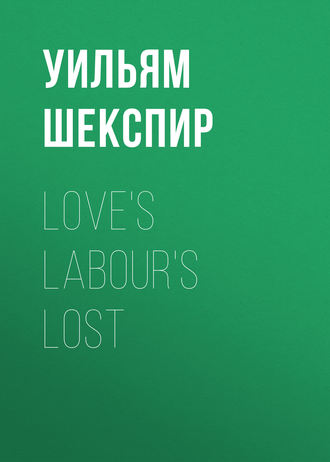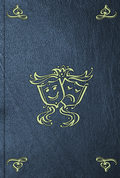полная версия

Уильям Шекспир
Love's Labour's Lost
Welcome, pure wit! Thou part'st a fair fray.
COSTARD. O Lord, sir, they would know
Whether the three Worthies shall come in or no?
BEROWNE. What, are there but three?
COSTARD. No, sir; but it is vara fine,
For every one pursents three.
BEROWNE. And three times thrice is nine.
COSTARD. Not so, sir; under correction, sir,
I hope it is not so.
You cannot beg us, sir, I can assure you, sir; we know what
we
know;
I hope, sir, three times thrice, sir-
BEROWNE. Is not nine.
COSTARD. Under correction, sir, we know whereuntil it doth
amount.
BEROWNE. By Jove, I always took three threes for nine.
COSTARD. O Lord, sir, it were pity you should get your living
by
reck'ning, sir.
BEROWNE. How much is it?
COSTARD. O Lord, sir, the parties themselves, the actors, sir,
will
show whereuntil it doth amount. For mine own part, I am, as
they
say, but to parfect one man in one poor man, Pompion the
Great,
sir.
BEROWNE. Art thou one of the Worthies?
COSTARD. It pleased them to think me worthy of Pompey the
Great;
for mine own part, I know not the degree of the Worthy; but I
am
to stand for him.
BEROWNE. Go, bid them prepare.
COSTARD. We will turn it finely off, sir; we will take some
care.
Exit COSTARD
KING. Berowne, they will shame us; let them not approach.
BEROWNE. We are shame-proof, my lord, and 'tis some policy
To have one show worse than the King's and his company.
KING. I say they shall not come.
PRINCESS OF FRANCE. Nay, my good lord, let me o'errule you now.
That sport best pleases that doth least know how;
Where zeal strives to content, and the contents
Dies in the zeal of that which it presents.
Their form confounded makes most form in mirth,
When great things labouring perish in their birth.
BEROWNE. A right description of our sport, my lord.
Enter ARMADO
ARMADO. Anointed, I implore so much expense of thy royal sweet
breath as will utter a brace of words.
[Converses apart with the KING, and delivers a paper]
PRINCESS OF FRANCE. Doth this man serve God?
BEROWNE. Why ask you?
PRINCESS OF FRANCE. 'A speaks not like a man of God his making.
ARMADO. That is all one, my fair, sweet, honey monarch; for, I
protest, the schoolmaster is exceeding fantastical; too too
vain,
too too vain; but we will put it, as they say, to fortuna de
la
guerra. I wish you the peace of mind, most royal couplement!
Exit ARMADO
KING. Here is like to be a good presence of Worthies. He
presents
Hector of Troy; the swain, Pompey the Great; the parish
curate,
Alexander; Arinado's page, Hercules; the pedant, Judas
Maccabaeus.
And if these four Worthies in their first show thrive,
These four will change habits and present the other five.
BEROWNE. There is five in the first show.
KING. You are deceived, 'tis not so.
BEROWNE. The pedant, the braggart, the hedge-priest, the fool,
and
the boy:
Abate throw at novum, and the whole world again
Cannot pick out five such, take each one in his vein.
KING. The ship is under sail, and here she comes amain.
Enter COSTARD, armed for POMPEY
COSTARD. I Pompey am-
BEROWNE. You lie, you are not he.
COSTARD. I Pompey am-
BOYET. With libbard's head on knee.
BEROWNE. Well said, old mocker; I must needs be friends with
thee.
COSTARD. I Pompey am, Pompey surnam'd the Big-
DUMAIN. The Great.
COSTARD. It is Great, sir.
Pompey surnam'd the Great,
That oft in field, with targe and shield, did make my foe to
sweat;
And travelling along this coast, I bere am come by chance,
And lay my arms before the legs of this sweet lass of France.
If your ladyship would say 'Thanks, Pompey,' I had done.
PRINCESS OF FRANCE. Great thanks, great Pompey.
COSTARD. 'Tis not so much worth; but I hope I was perfect.
I made a little fault in Great.
BEROWNE. My hat to a halfpenny, Pompey proves the best Worthy.
Enter SIR NATHANIEL, for ALEXANDER
NATHANIEL. When in the world I liv'd, I was the world's
commander;
By east, west, north, and south, I spread my conquering
might.
My scutcheon plain declares that I am Alisander-
BOYET. Your nose says, no, you are not; for it stands to right.
BEROWNE. Your nose smells 'no' in this, most tender-smelling
knight.
PRINCESS OF FRANCE. The conqueror is dismay'd. Proceed, good
Alexander.
NATHANIEL. When in the world I liv'd, I was the world's
commander-
BOYET. Most true, 'tis right, you were so, Alisander.
BEROWNE. Pompey the Great!
COSTARD. Your servant, and Costard.
BEROWNE. Take away the conqueror, take away Alisander.
COSTARD. [To Sir Nathaniel] O, Sir, you have overthrown
Alisander
the conqueror! You will be scrap'd out of the painted cloth
for
this. Your lion, that holds his poleaxe sitting on a
close-stool,
will be given to Ajax. He will be the ninth Worthy. A
conqueror
and afeard to speak! Run away for shame, Alisander.
[Sir Nathaniel retires] There, an't shall please you, a
foolish
mild man; an honest man, look you, and soon dash'd. He is a
marvellous good neighbour, faith, and a very good bowler; but
for
Alisander- alas! you see how 'tis- a little o'erparted. But
there
are Worthies a-coming will speak their mind in some other
sort.
PRINCESS OF FRANCE. Stand aside, good Pompey.
Enter HOLOFERNES, for JUDAS; and MOTH, for HERCULES
HOLOFERNES. Great Hercules is presented by this imp,
Whose club kill'd Cerberus, that three-headed canus;
And when be was a babe, a child, a shrimp,
Thus did he strangle serpents in his manus.
Quoniam he seemeth in minority,
Ergo I come with this apology.
Keep some state in thy exit, and vanish. [MOTH retires]
Judas I am-
DUMAIN. A Judas!
HOLOFERNES. Not Iscariot, sir.
Judas I am, ycliped Maccabaeus.
DUMAIN. Judas Maccabaeus clipt is plain Judas.
BEROWNE. A kissing traitor. How art thou prov'd Judas?
HOLOFERNES. Judas I am-
DUMAIN. The more shame for you, Judas!
HOLOFERNES. What mean you, sir?
BOYET. To make Judas hang himself.
HOLOFERNES. Begin, sir; you are my elder.
BEROWNE. Well followed: Judas was hanged on an elder.
HOLOFERNES. I will not be put out of countenance.
BEROWNE. Because thou hast no face.
HOLOFERNES. What is this?
BOYET. A cittern-head.
DUMAIN. The head of a bodkin.
BEROWNE. A death's face in a ring.
LONGAVILLE. The face of an old Roman coin, scarce seen.
BOYET. The pommel of Coesar's falchion.
DUMAIN. The carv'd-bone face on a flask.
BEROWNE. Saint George's half-cheek in a brooch.
DUMAIN. Ay, and in a brooch of lead.
BEROWNE. Ay, and worn in the cap of a tooth-drawer. And now,
forward; for we have put thee in countenance.
HOLOFERNES. You have put me out of countenance.
BEROWNE. False: we have given thee faces.
HOLOFERNES. But you have outfac'd them all.
BEROWNE. An thou wert a lion we would do so.
BOYET. Therefore, as he is an ass, let him go.
And so adieu, sweet Jude! Nay, why dost thou stay?
DUMAIN. For the latter end of his name.
BEROWNE. For the ass to the Jude; give it him- Jud-as, away.
HOLOFERNES. This is not generous, not gentle, not humble.
BOYET. A light for Monsieur Judas! It grows dark, he may
stumble.
[HOLOFERNES retires]
PRINCESS OF FRANCE. Alas, poor Maccabaeus, how hath he been
baited!
Enter ARMADO, for HECTOR
BEROWNE. Hide thy head, Achilles; here comes Hector in arms.
DUMAIN. Though my mocks come home by me, I will now be merry.
KING. Hector was but a Troyan in respect of this.
BOYET. But is this Hector?
DUMAIN. I think Hector was not so clean-timber'd.
LONGAVILLE. His leg is too big for Hector's.
DUMAIN. More calf, certain.
BOYET. No; he is best indued in the small.
BEROWNE. This cannot be Hector.
DUMAIN. He's a god or a painter, for he makes faces.
ARMADO. The armipotent Mars, of lances the almighty,
Gave Hector a gift-
DUMAIN. A gilt nutmeg.
BEROWNE. A lemon.
LONGAVILLE. Stuck with cloves.
DUMAIN. No, cloven.
ARMADO. Peace!
The armipotent Mars, of lances the almighty,
Gave Hector a gift, the heir of Ilion;
A man so breathed that certain he would fight ye,
From morn till night out of his pavilion.
I am that flower-
DUMAIN. That mint.
LONGAVILLE. That columbine.
ARMADO. Sweet Lord Longaville, rein thy tongue.
LONGAVILLE. I must rather give it the rein, for it runs against
Hector.
DUMAIN. Ay, and Hector's a greyhound.
ARMADO. The sweet war-man is dead and rotten; sweet chucks,
beat
not the bones of the buried; when he breathed, he was a man.
But
I will forward with my device. [To the PRINCESS] Sweet
royalty,
bestow on me the sense of hearing.
[BEROWNE steps forth, and speaks to COSTARD]
PRINCESS OF FRANCE. Speak, brave Hector; we are much delighted.
ARMADO. I do adore thy sweet Grace's slipper.
BOYET. [Aside to DUMAIN] Loves her by the foot.
DUMAIN. [Aside to BOYET] He may not by the yard.
ARMADO. This Hector far surmounted Hannibal-
COSTARD. The party is gone, fellow Hector, she is gone; she is
two
months on her way.
ARMADO. What meanest thou?
COSTARD. Faith, unless you play the honest Troyan, the poor
wench
is cast away. She's quick; the child brags in her belly
already;
'tis yours.
ARMADO. Dost thou infamonize me among potentates? Thou shalt
die.
COSTARD. Then shall Hector be whipt for Jaquenetta that is
quick by
him, and hang'd for Pompey that is dead by him.
DUMAIN. Most rare Pompey!
BOYET. Renowned Pompey!
BEROWNE. Greater than Great! Great, great, great Pompey! Pompey
the
Huge!
DUMAIN. Hector trembles.
BEROWNE. Pompey is moved. More Ates, more Ates! Stir them on!
stir
them on!
DUMAIN. Hector will challenge him.
BEROWNE. Ay, if 'a have no more man's blood in his belly than
will
sup a flea.
ARMADO. By the North Pole, I do challenge thee.
COSTARD. I will not fight with a pole, like a Northern man;
I'll
slash; I'll do it by the sword. I bepray you, let me borrow
my
arms again.
DUMAIN. Room for the incensed Worthies!
COSTARD. I'll do it in my shirt.
DUMAIN. Most resolute Pompey!
MOTH. Master, let me take you a buttonhole lower. Do you not
see
Pompey is uncasing for the combat? What mean you? You will
lose
your reputation.
ARMADO. Gentlemen and soldiers, pardon me; I will not combat in
my
shirt.
DUMAIN. You may not deny it: Pompey hath made the challenge.
ARMADO. Sweet bloods, I both may and will.
BEROWNE. What reason have you for 't?
ARMADO. The naked truth of it is: I have no shirt; I go
woolward
for penance.
BOYET. True, and it was enjoined him in Rome for want of linen;
since when, I'll be sworn, he wore none but a dishclout of
Jaquenetta's, and that 'a wears next his heart for a favour.
Enter as messenger, MONSIEUR MARCADE
MARCADE. God save you, madam!
PRINCESS OF FRANCE. Welcome, Marcade;
But that thou interruptest our merriment.
MARCADE. I am sorry, madam; for the news I bring
Is heavy in my tongue. The King your father-
PRINCESS OF FRANCE. Dead, for my life!
MARCADE. Even so; my tale is told.
BEROWNE. WOrthies away; the scene begins to cloud.
ARMADO. For mine own part, I breathe free breath. I have seen
the
day of wrong through the little hole of discretion, and I
will
right myself like a soldier. Exeunt WORTHIES
KING. How fares your Majesty?
PRINCESS OF FRANCE. Boyet, prepare; I will away to-night.
KING. Madam, not so; I do beseech you stay.
PRINCESS OF FRANCE. Prepare, I say. I thank you, gracious
lords,
For all your fair endeavours, and entreat,
Out of a new-sad soul, that you vouchsafe
In your rich wisdom to excuse or hide
The liberal opposition of our spirits,
If over-boldly we have borne ourselves
In the converse of breath- your gentleness
Was guilty of it. Farewell, worthy lord.
A heavy heart bears not a nimble tongue.
Excuse me so, coming too short of thanks
For my great suit so easily obtain'd.
KING. The extreme parts of time extremely forms
All causes to the purpose of his speed;
And often at his very loose decides
That which long process could not arbitrate.
And though the mourning brow of progeny
Forbid the smiling courtesy of love
The holy suit which fain it would convince,
Yet, since love's argument was first on foot,
Let not the cloud of sorrow justle it
From what it purpos'd; since to wail friends lost
Is not by much so wholesome-profitable
As to rejoice at friends but newly found.
PRINCESS OF FRANCE. I understand you not; my griefs are double.
BEROWNE. Honest plain words best pierce the ear of grief;
And by these badges understand the King.
For your fair sakes have we neglected time,
Play'd foul play with our oaths; your beauty, ladies,
Hath much deformed us, fashioning our humours
Even to the opposed end of our intents;
And what in us hath seem'd ridiculous,
As love is full of unbefitting strains,
All wanton as a child, skipping and vain;
Form'd by the eye and therefore, like the eye,
Full of strange shapes, of habits, and of forms,
Varying in subjects as the eye doth roll
To every varied object in his glance;
Which parti-coated presence of loose love
Put on by us, if in your heavenly eyes
Have misbecom'd our oaths and gravities,
Those heavenly eyes that look into these faults
Suggested us to make. Therefore, ladies,
Our love being yours, the error that love makes
Is likewise yours. We to ourselves prove false,
By being once false for ever to be true
To those that make us both- fair ladies, you;
And even that falsehood, in itself a sin,
Thus purifies itself and turns to grace.
PRINCESS OF FRANCE. We have receiv'd your letters, full of
love;
Your favours, the ambassadors of love;
And, in our maiden council, rated them
At courtship, pleasant jest, and courtesy,
As bombast and as lining to the time;
But more devout than this in our respects
Have we not been; and therefore met your loves
In their own fashion, like a merriment.
DUMAIN. Our letters, madam, show'd much more than jest.
LONGAVILLE. So did our looks.
ROSALINE. We did not quote them so.
KING. Now, at the latest minute of the hour,
Grant us your loves.
PRINCESS OF FRANCE. A time, methinks, too short
To make a world-without-end bargain in.
No, no, my lord, your Grace is perjur'd much,
Full of dear guiltiness; and therefore this,
If for my love, as there is no such cause,
You will do aught- this shall you do for me:
Your oath I will not trust; but go with speed
To some forlorn and naked hermitage,
Remote from all the pleasures of the world;
There stay until the twelve celestial signs
Have brought about the annual reckoning.
If this austere insociable life
Change not your offer made in heat of blood,
If frosts and fasts, hard lodging and thin weeds,
Nip not the gaudy blossoms of your love,
But that it bear this trial, and last love,
Then, at the expiration of the year,
Come, challenge me, challenge me by these deserts;
And, by this virgin palm now kissing thine,
I will be thine; and, till that instant, shut
My woeful self up in a mournful house,
Raining the tears of lamentation
For the remembrance of my father's death.
If this thou do deny, let our hands part,
Neither intitled in the other's heart.
KING. If this, or more than this, I would deny,
To flatter up these powers of mine with rest,
The sudden hand of death close up mine eye!
Hence hermit then, my heart is in thy breast.
BEROWNE. And what to me, my love? and what to me?
ROSALINE. You must he purged too, your sins are rack'd;
You are attaint with faults and perjury;
Therefore, if you my favour mean to get,
A twelvemonth shall you spend, and never rest,
But seek the weary beds of people sick.
DUMAIN. But what to me, my love? but what to me?
A wife?
KATHARINE. A beard, fair health, and honesty;
With threefold love I wish you all these three.
DUMAIN. O, shall I say I thank you, gentle wife?
KATHARINE. No so, my lord; a twelvemonth and a day
I'll mark no words that smooth-fac'd wooers say.
Come when the King doth to my lady come;
Then, if I have much love, I'll give you some.
DUMAIN. I'll serve thee true and faithfully till then.
KATHARINE. Yet swear not, lest ye be forsworn again.
LONGAVILLE. What says Maria?
MARIA. At the twelvemonth's end
I'll change my black gown for a faithful friend.
LONGAVILLE. I'll stay with patience; but the time is long.
MARIA. The liker you; few taller are so young.
BEROWNE. Studies my lady? Mistress, look on me;
Behold the window of my heart, mine eye,
What humble suit attends thy answer there.
Impose some service on me for thy love.
ROSALINE. Oft have I heard of you, my Lord Berowne,
Before I saw you; and the world's large tongue
Proclaims you for a man replete with mocks,
Full of comparisons and wounding flouts,
Which you on all estates will execute
That lie within the mercy of your wit.
To weed this wormwood from your fruitful brain,
And therewithal to win me, if you please,
Without the which I am not to be won,
You shall this twelvemonth term from day to day
Visit the speechless sick, and still converse
With groaning wretches; and your task shall be,
With all the fierce endeavour of your wit,
To enforce the pained impotent to smile.
BEROWNE. To move wild laughter in the throat of death?
It cannot be; it is impossible;
Mirth cannot move a soul in agony.
ROSALINE. Why, that's the way to choke a gibing spirit,
Whose influence is begot of that loose grace
Which shallow laughing hearers give to fools.
A jest's prosperity lies in the ear
Of him that hears it, never in the tongue
Of him that makes it; then, if sickly ears,
Deaf'd with the clamours of their own dear groans,
Will hear your idle scorns, continue then,
And I will have you and that fault withal.
But if they will not, throw away that spirit,
And I shall find you empty of that fault,
Right joyful of your reformation.
BEROWNE. A twelvemonth? Well, befall what will befall,
I'll jest a twelvemonth in an hospital.
PRINCESS OF FRANCE. [ To the King] Ay, sweet my lord, and so I
take
my leave.
KING. No, madam; we will bring you on your way.
BEROWNE. Our wooing doth not end like an old play:
Jack hath not Jill. These ladies' courtesy
Might well have made our sport a comedy.
KING. Come, sir, it wants a twelvemonth an' a day,
And then 'twill end.
BEROWNE. That's too long for a play.
Re-enter ARMADO
ARMADO. Sweet Majesty, vouchsafe me-
PRINCESS OF FRANCE. Was not that not Hector?
DUMAIN. The worthy knight of Troy.
ARMADO. I will kiss thy royal finger, and take leave. I am a
votary: I have vow'd to Jaquenetta to hold the plough for her
sweet love three year. But, most esteemed greatness, will you
hear the dialogue that the two learned men have compiled in
praise of the Owl and the Cuckoo? It should have followed in
the
end of our show.
KING. Call them forth quickly; we will do so.
ARMADO. Holla! approach.
Enter All
This side is Hiems, Winter; this Ver, the Spring- the one
maintained by the Owl, th' other by the Cuckoo. Ver, begin.
SPRING
When daisies pied and violets blue
And lady-smocks all silver-white
And cuckoo-buds of yellow hue
Do paint the meadows with delight,
The cuckoo then on every tree
Mocks married men, for thus sings he:
'Cuckoo;
Cuckoo, cuckoo'– O word of fear,
Unpleasing to a married ear!
When shepherds pipe on oaten straws,
And merry larks are ploughmen's clocks;
When turtles tread, and rooks and daws,
And maidens bleach their summer smocks;
The cuckoo then on every tree
Mocks married men, for thus sings he:
'Cuckoo;
Cuckoo, cuckoo'– O word of fear,
Unpleasing to a married ear!





